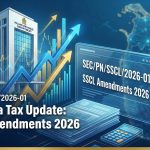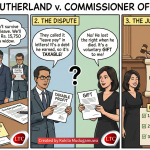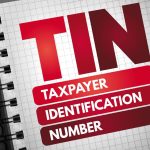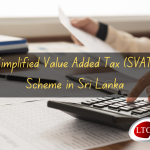The 2026 Budget introduces a series of revenue proposals aimed at broadening the tax base, creating a level playing field between local and imported products, and modernising Sri Lanka’s tax administration.
This article summarises the main tax-related proposals and explains their practical impact on businesses and taxpayers.
1. VAT & SSCL on Imported Coconut Oil and Palm Oil
What is changing?
At present:
- Locally produced coconut oil and palm oil are subject to:
- Value Added Tax (VAT), and
- Social Security Contribution Levy (SSCL).
- Imported coconut oil and palm oil are not subject to VAT/SSCL on import. Instead, they are taxed through a Special Commodity Levy (SCL) of:
- Rs. 150 per kg – coconut oil
- Rs. 275 per kg – palm oil
From April 2026, it is proposed to:
- Remove the Special Commodity Levy (SCL) on imported coconut oil and palm oil; and
- Bring imported coconut oil and palm oil under the general tax structure, including VAT (and presumably SSCL).
Why this matters
The stated intention is to create a “level playing field” between local producers and importers. In simple terms:
- Currently, local producers charge VAT/SSCL, while importers pay a fixed per-kg levy at the border.
- Under the new system, imported products will also bear VAT (and SSCL), similar to local producers.
Impact for businesses:
- Importers of coconut oil and palm oil will need to factor in VAT and SSCL when pricing products.
- Registered VAT payers may be able to claim input VAT, reducing the effective burden.
- Retail prices may adjust depending on how VAT compares with the present SCL cost.
2. Lower VAT & SSCL Registration Threshold – Rs. 60m → Rs. 36m
What is changing?
Currently, a person must register for VAT and SSCL when annual taxable turnover reaches Rs. 60 million.
From 1 April 2026, it is proposed to reduce the annual registration threshold to Rs. 36 million for both VAT and SSCL.
Rs. 36 million per year ≈ Rs. 3 million per month.
Why this matters
This is a tax base broadening measure:
- More small and medium-sized businesses will fall within the VAT and SSCL net.
- Businesses with annual turnover between Rs. 36m and Rs. 60m, which are currently outside the regime, will now likely need to register, charge VAT, and file returns.
Practical implications:
- If your annual turnover is close to or above Rs. 36m, you should:
- Start monitoring turnover monthly.
- Get ready for VAT/SSCL registration – systems, invoicing, accounting, and compliance.
- Suppliers newly registered for VAT will need to issue proper tax invoices, maintain records, and may be able to claim input VAT.
Lanka Tax Club will issue separate guidance closer to April 2026 on who must register and how to manage the transition.
3. Removal of CESS & Imposition of VAT on Imported Fabric
What is changing?
Currently:
- Locally manufactured fabric – subject to VAT.
- Imported fabric – exempt from VAT, but subject to a CESS of Rs. 100 per kg.
From 1 April 2026, the proposal is to:
- Remove the CESS on imported fabric; and
- Impose VAT on imported fabric, just like on locally manufactured fabric.
Why this matters
Again, the aim is to align tax treatment between local and imported fabric.
For importers and garment sector businesses:
- The Rs. 100 per kg CESS will disappear.
- Instead, VAT will apply at the standard rate on the taxable value.
- VAT-registered businesses may be able to claim input VAT, which could help manage cash flow and cost if proper documentation is maintained.
Overall impact on cost will depend on:
- Current landed value,
- VAT rate at that time, and
- Whether the business is registered and able to claim input VAT credits.
4. SSCL on Vehicles Collected at Import/Manufacture Stage
What is changing?
It has been observed that SSCL on vehicle sales is not being collected properly, particularly in the after-sales market.
To address this, from April 2026 it is proposed to:
- Charge SSCL at the time of:
- Import, or
- Manufacture and first sale of vehicles; and
- Exempt after-sales transactions from SSCL.
Why this matters
This is an administrative and enforcement measure designed to reduce leakage:
- Instead of relying on multiple downstream sellers to charge and remit SSCL, the levy will be collected upfront.
- After-market buyers and sellers (e.g., second-hand vehicle dealers, individuals) will not have to deal with SSCL on subsequent sales.
Vehicle importers, manufacturers, and first-sale dealers should:
- Revisit pricing structures to incorporate SSCL at the initial transaction, and
- Ensure proper tax accounting and documentation to demonstrate compliance.
5. Implementation of the National Tariff Policy – New Customs Duty Bands
What is changing?
Sri Lanka currently uses Customs Import Duty (CID) bands of 0%, 15%, and 20%.
From April 2026, in line with the National Tariff Policy, it is proposed to revise CID rates to:
- 0%, 10%, 20%, and 30%.
In addition, the Government aims to gradually phase out para-tariffs (such as certain CESS/SCL-type levies) using this revised tariff structure, while protecting government revenue through a time-bound plan.
Why this matters
For importers and local producers:
- Some goods currently taxed at 15% may move to 10% (reducing cost) or be reclassified into the 20% or 30% bands (increasing cost).
- The phasing out of para-tariffs may simplify the overall tariff structure, but the effective tax burden will depend on how individual HS codes are mapped to the new bands.
Businesses engaged in import/export should:
- Closely monitor the tariff schedules and HS classifications issued alongside this policy.
- Revisit product pricing, sourcing strategies, and contracts once detailed schedules are published.
6. Modernising the Tax Audit Framework
What is changing?
From returns filed from January 2026 onwards, the Government plans to introduce a modern tax audit framework with the following features:
- Risk-based selection of audit cases, using transparent criteria managed by a Risk Management Unit.
- Where required, cases may be reviewed by a committee appointed by the Commissioner General of Inland Revenue.
- Aim is to streamline audit procedures and reduce illegal connections and discretionary interventions between taxpayers and officials.
These changes will be implemented through amendments to relevant tax statutes.
Why this matters
The focus shifts towards:
- Transparency,
- Risk-based audits, and
- Reduced room for ad-hoc decision-making.
For taxpayers:
- Those with better record-keeping, consistent filing, and transparent transactions are likely to be seen as lower risk.
- Poor compliance, under-reporting, or inconsistent declarations increase the likelihood of being flagged for audit.
Practical steps:
- Maintain complete and accurate documentation (invoices, ledgers, bank reconciliations).
- Ensure consistency across VAT, Income Tax, SSCL, Customs, and other filings.
- Treat electronic systems (e-invoicing, RAMIS reporting) as core evidence – not just a formality.
7. Changes to Telecommunications Levy & Stronger AML/CFT Linkages
Telecommunications Levy – Bad Debts
It is proposed that:
- Bad debts incurred by telecommunications service providers must still be included in the taxable base when calculating Telecommunications Levy.
- If such bad debts are later recovered, the recovered amount should also be included in the levy computation.
In simple terms, writing off a bill as “bad debt” will not allow the telco to avoid the levy; and any later recovery will also be taxed.
Strengthening AML/CFT Through Tax Laws
The Budget also proposes to:
- Insert legal provisions in tax laws to allow the exchange of information between:
- Tax administration authorities,
- The Financial Intelligence Unit (FIU), and
- Other enforcement agencies.
- Introduce provisions in all tax laws relating to:
- Definitions and interpretation of tax-related crimes,
- Prosecution by the Attorney-General, and
- Fines and penalties for offences.
Why this matters
For businesses and professionals:
- Telecommunications operators face a more transparent and less flexible levy calculation method.
- Taxpayers involved in suspicious transactions face a higher risk that their tax data will be shared with AML/CFT authorities.
- Advisors must be more careful in structuring transactions and ensuring that tax and AML/CFT obligations are both fully met.
8. National Electronic Invoicing System (e-Invoicing) via RAMIS
What is planned?
Sri Lanka is moving towards a national e-invoicing system, using an API-based integrated framework between:
- Taxpayers’ ERP systems, and
- The Revenue Administration Management Information System (RAMIS).
The plan is to roll this out in three phases:
- Phase 1 – Pilot with selected companies & exporters
- A group of companies that have upgraded their ERPs for API integration will join a pilot.
- Export-oriented enterprises will be a key focus.
- Phase 2 – All VAT-registered taxpayers
- Once the pilot is successful, all VAT-registered taxpayers will be brought into the e-invoicing system.
- Phase 3 – Point-of-Sale (POS) integration
- E-invoicing will be rolled out via POS machines to capture real-time B2C transactions.
- The goal is to improve tax compliance, reduce under-reporting, and enhance efficiency and transparency of VAT administration through a fully web-based platform.
Why this matters
This is one of the most significant digitalisation reforms in recent years.
For businesses:
- ERP systems and billing software will need to integrate with RAMIS APIs.
- Proper IT governance, data accuracy, and cyber-security become critical.
- VAT invoices will increasingly be validated electronically, reducing manual errors but also reducing scope for manipulation.
Practical steps now:
- Assess whether your current invoicing/ERP system can support API-based e-invoicing.
- Budget for system upgrades, staff training, and process changes.
- Keep an eye on IRD guidelines, technical specifications, and pilot announcements.
Lanka Tax Club will continue to update readers on technical and compliance aspects of e-invoicing as more details are released.
9. A Single Office Complex for the Inland Revenue Department
What is changing?
The Inland Revenue Department (IRD) currently operates across multiple premises. The proposal is to:
- Establish a new office complex to bring the main office and related units under a single premises.
- Allocate Rs. 2,000 million (Rs. 2 billion) for this project, following location selection and feasibility studies.
Why this matters
For taxpayers:
- A single, modern IRD complex should support:
- More efficient service delivery,
- Better integration with digital systems, and
- A more convenient “one-stop” experience for those who still need physical visits.
For the tax system:
- Centralisation and improved infrastructure can help the IRD:
- Enhance taxpayer services,
- Strengthen internal coordination, and
- Support the broader agenda of sustainable and digital-driven revenue administration.
Final Thoughts
The 2026 Budget revenue proposals reflect three clear directions:
- Broadening the tax base
– Lower VAT/SSCL thresholds, bringing more businesses into the formal net. - Level playing field for local vs. imported goods
– Shifting from para-tariffs (SCL, CESS) to VAT and customs duty on imported oils and fabric. - Modern, digital, rules-based tax administration
– Risk-based audits, e-invoicing via RAMIS, stronger AML/CFT linkages, and investment in IRD infrastructure.
For taxpayers and professionals, the message is clear:
Prepare early. Review your turnover, systems, documentation, and pricing, and get ready for a more transparent, digital, and compliance-focused tax environment from 2026 onwards.
Download Full Budget Speech – 2026
Disclaimer: This article is based on the 2026 Budget proposals as announced. All measures are subject to enabling legislation, regulations, and official guidance from the relevant authorities. Always seek professional advice for decisions affecting your business or personal tax position.














